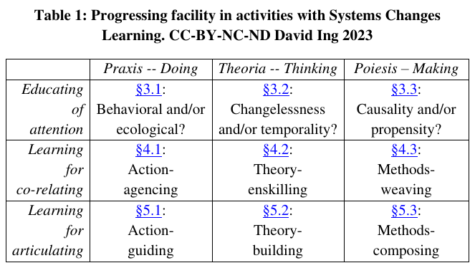A special issue on “Sustainable, Smart and Systemic Design Post-Anthropocene: Through a Transdisciplinary Lens” in the Journal of Systemics, Cybernetics and Informatics edited by Marie Davidová, Susu Nousala, and Thomas J. Marlowe has been released. In that issue, the journey of the Systems Changes Learning Circle from 2019 through 2022 is reviewed.
The editorial team, in the introductory article, wrote some descriptions about the contribution.
In the first paper, Ing (2023) presents an overview of the history, background, and philosophy of System Change Learning, integrating classical Chinese thought with Western professional practices to revisit the Aristotelean trilogy of doing (praxis), thinking (theoria) and making (poiesis) to construct a distinctly inter-/trans-disciplinary and collaborative approach that unifies the three.
The first paper invites a change of perspective through thinking based on in-depth exploration and explanation of the background, and philosophical approach of systemic learning, and the relationship to change. The author does this by introducing us to the concept of System Change Learning and unpacking the potential and versatility of this thinking for future applications, in particular, collaborative approaches.
This is the first fully peer-reviewed article about Systems Changes Learning in an academic journal!
Here’s the published abstract.
Abstract
Entering 2023, the Systems Changes Learning Circle completed in its fourth year of 10-year journey on “Rethinking Systems Thinking”. In a contextural action learning approach, the Circle has elevated rhythmic shifts as the feature that both resonates with practitioners in the field, and fits with a post-colonial philosophy of science bridging classical Chinese thought with Western professional practices. This multiparadigm inquiry recasts and reifies the activities of doing (praxis), thinking (theoria) and making (poiesis). The facility with this approach is deepened through three levels: (i) educating of attention, orienting novices towards contrasting modes of thought; (ii) learning for co-relating, lending a way for practitioners to critically appreciate their situations, and (iii) learning for articulating, aiding mentors to guide groups productively through mutual learning style.
Citation
Ing, David. 2022. “Systems Changes Learning: Recasting and Reifying Rhythmic Shifts for Doing, alongside Thinking and Making.” Journal of Systemics, Cybernetics and Informatics 20 (7): 11–73. https://doi.org/10.54808/JSCI.20.07.11 .
Reference
Davidová, Marie, Susu Nousala, and Thomas J. Marlowe. 2022. “Editorial Introduction – Sustainable, Smart and Systemic Design Post-Anthropocene: Through a Transdisciplinary Lens.” Journal of Systemics, Cybernetics and Informatics 20 (7): 1–10. https://doi.org/10.54808/JSCI.20.07.1.



